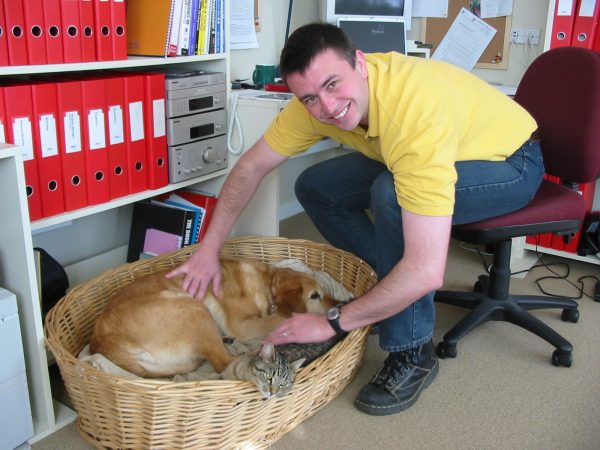
Celebrating 20 years in business provides an opportunity to look back on our journey and see what we’ve achieved at Abley.
We’ve come a long way since I established Abley in 2003, doing transportation consulting from the living room of my family home in Christchurch.
We quickly outgrew the living room, and our next move was a little unconventional. My wife Michelle and I bought Dorset House – a backpacker’s lodge in Dorset Street in the central city. We moved our family into the backpackers and started running Abley from the front room, as well as operating the backpackers. Managing a family and two businesses under one roof was tricky. As Abley grew, we took over more and more of the backpacker rooms, until our team filled up a disproportionate part of the accommodation and we had to move Abley into nearby office space. Dorset House backpackers is an important part of our journey, and my wife and I still own the building today – we even named one of Abley’s meeting rooms after it.
Abley is now a company with around 90 team members, offices in Auckland, Wellington and Christchurch, remote team members as well as clients spread throughout New Zealand and Australia. We are thrilled to have recently secured our first United States-based client, allowing our team to influence better outcomes for road safety in the northern hemisphere, and enhancing our international presence.
Our work is recognised and valued by an incredibly diverse range of public and private sector clients, and this is highly motivating for our people. We are proud that many local, state and national governments and government entities, here and in Australia, choose Abley as their preferred experts, whether that is for transportation, road safety or location intelligence.

Saving lives on our roads
Abley initially focused on the transport effects of development, but moved into road safety when Paul Durdin joined the company in 2008. Paul is now Abley’s Technical Director – Transportation Engineering, an Abley board member and a shareholder. After me, he’s Abley’s longest serving employee.
New Zealand’s approach to road safety in the late 2000s focussed on black spots. These were the places where most deaths and serious injuries ’did’ occur, generally because more vehicles used those locations because there was greater conflict exposure. Whatever the reason, it was a reactive approach to identifying interventions and didn’t help identify where crashes ‘could’ occur.
Paul led a more proactive approach to risk, using variables such as traffic and other environmental variables to determine where crashes were more or less likely to occur. Starting in Christchurch, we worked with the City Council and looked at the total roading network, assessing every intersection to see whether it was performing better or worse than expected, so that lessons could be learned, or changes made to reduce death and serious injury.
This may seem like common sense, but back in 2008 it was highly innovative, and we were the only ones doing this type of analysis at a citywide level.

That initial work was well received, and we used the same analytical approach for Wellington and Auckland councils. Then, as word of our work spread, we added more and more road safety clients across New Zealand and Australia.
In 2003, our first year in business, there were 624 deaths and serious injuries from motor vehicle crashes in New Zealand. Last year there were 591 or a 5% reduction. Our population grew almost 30% in the same period so anecdotally we’re doing better. We can’t take credit for that improvement, but we certainly like to think our road safety work has made an important contribution.
Regardless, one death is still too many. We want parents and children – wherever they are in the world – to come home each night and be together. We don’t want anyone to have to mourn the loss of a family member in an avoidable tragedy. That’s what drives our road safety work.
Abley now has a strong reputation as the road safety experts in New Zealand and we are focused on expanding that to encompass all of Australasia. We want to be the experts of choice for transport and location intelligence work.
The United States is the next step in our road safety journey. Their problems are similar – it’s the scale that’s different. The equivalent of the population of Gisborne or Upper Hutt is killed every year in road crashes in America – and that’s a powerful incentive for change.

Abley has grown steadily in the past 20 years in response to the value we provide, and increased demand for our services has followed. Our first employee was a GIS expert and we built on that focus as we incorporated more and more data and location intelligence into our work.
Our expansion is a continuous evolution. From our origins in transport planning and engineering, we’ve moved into road safety, location intelligence, climate and sustainability, and data technology.
We’ve brought in highly skilled and experienced team members to help us on this journey, as well as many younger people who demonstrate exciting potential. We’re constantly adapting our skills to meet the current and anticipated needs of our clients.
I believe it’s better to employ the people you think you’re going to need – before you think you’re going to need them. Clients recognise your capabilities, and this leads to more work. This approach has worked well for us at Abley where talent has attracted demand.
I’m also a very strong believer in company culture. Culture smashes strategy every time. I think Abley is a culture exemplar. We formalised our values in 2008 and when we reviewed them nine years later they were all still valid. One needed tweaking, and we added passion as a value – something we’ve always had but which we hadn’t formally captured. When we interview people for roles at Abley, we assess each person against how we think they will align with our values. At Abley, I’m proud to say, “we live our values”.

Becoming the brand of choice
Looking to the future, we’re focused on making sure that Abley stays relevant as a guardian of knowledge. Knowledge is becoming increasingly democratised, and we must continuously innovate and demonstrate wisdom.
A lot of the work that we did 20 years ago is commoditised work now, or just doesn’t exist. Changes to the Resource Management Act have got rid of whole lot of regulation, removing the need for some of the work we used to do. That’s a good thing, and means we have to reinvent ourselves and the work we do to remain relevant.
I want to see Abley continuously grow by expanding the intellectual power within the company. One of the ways that we do that is by helping create great careers for our people. I’m really proud of the careers that we create, and we’ve seen our young people do incredible things.
More than anyone, I understand the importance of giving people encouragement and opportunities. I had my fair share as I made the journey from high school dropout to junior office boy at an engineering and surveying company, to university graduate with an engineering degree and then to becoming a consultant and part of the team that created the Abley company we know today.
Abley’s next 20 years will look very different to the last 20. What we can say is that professional services are changing and we are increasingly looking at everything we do through a lens of technology. Companies must adapt to survive and Abley’s journey is proof of that.
Abley’s continual investment into our people means Abley will remain relevant in an ever-changing world.



